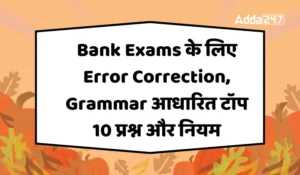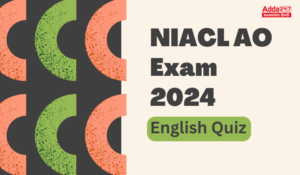Directions (1-5): Read each of the following sentences to find out if there is any grammatical error in it. The error, if any, will be in one part of the sentence. The number (A, B, C or D) of this part is your answer. If there is no error in the statement, then mark option (e) as your answer choice.
Q1. An expert committee report on faulty hip prosthetics (A)/sold by a subsidiary of the U.S. firm (B)/Johnson & Johnson has revealed incriminating (C)/details about its negligence of dealing with Indian patients. (D)/
Q2. The large-scale mobilisation of troops by the Syrian government (A)/and its allies around the northwestern Idlib province, the last (B)/major opposition-held enclave, has led to speculation about a imminent (C)/attack as well as calls to avoid a humanitarian catastrophe. (D)/
Q3. Russia, the Syrian regime’s mainly backer, has (A)/launched military manoeuvres in the (B)/Mediterranean region, while Syrian (C)/troops and Iran-trained militias have mobilised in the Idlib region. (D)/
Q4. The Centre may not own (A)/up to the fiasco off (B)/demonetisation but it could (C)/sort out wrinkles. (D)/
Q5. The Reserve Bank of India’s annual report for (A)/2017-18 reveals that 99.3% of currency notes (B)/that were demonetised at midnight (C)/on November 8, 2016 have returned to the banking system. (D)/
Directions (6-15): In each Question below, a sentence is given with four words given in Bold in the sentence. Among these bold words one may be wrongly spelt. The option of that word is the answer. If all four words are correctly spelt mark €. i.e. 'All Correct' as the answer.
Q6. Post demonetisation, cashles modes of payment have become more common but financial savings in the form of currency have also risen, suggesting that people still value cash.
Q7. Not all policy choices work out and acceing mistakes and working on those flaws help strengthen governance processes.
Q8. Political will is integral to the tackling of India’s hazardous air pollution.
Q9. An assessment of the quality of air across countries and in cities has come as a fresh warning to India on the levels of deadly pollutnts its citizens are breathing.
Q10. The IQ AirVisual 2018 World Air Quality Report published in collabration with Greenpeace underscores that Delhi remains an extremely hazardous city to live in.
Q11. The monitoring of air quality in real time across cities and towns in India is far from adequate or uniform.
Q12. Cutting nitrogen and sulphur emissons from industrial processes needs a time-bound programme supervised by the Environment Ministry.
Q13. As the countdown for electins to the 17th Lok Sabha begins, the world’s largest democracy has a chance to re-imagine itself.
Q14. The vulnerabilities of the Indian democracy have been pronounced in the last five years, and some of its long-term gains have been undrmined.
Q15. It was April 2017 and 30 tuberculosis (TB) survivors were participating in a lively group exercise at a workshop in New Delhi.





 Practice for English Section: 15 Cloze T...
Practice for English Section: 15 Cloze T...
 Bank Exams के लिए Error Correction, Gram...
Bank Exams के लिए Error Correction, Gram...
 English Quiz For NIACL AO Mains 2024 Exa...
English Quiz For NIACL AO Mains 2024 Exa...










